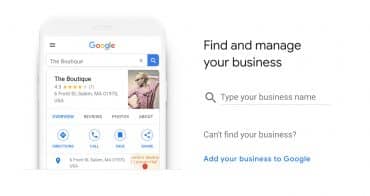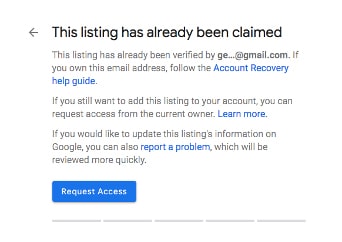Last time in this digital marketing series, Mark Homer explained the importance of digital marketing in building a referral network — and four steps you need to take to “protect your referrals.” In this post, he focuses on the first step: how to claim and optimize your law firm’s directory listings.
A Template for Claiming and Optimizing Directory Listings
Directory listings are simply websites that contain information about your law firm and, sometimes, your firm’s individual lawyers. There are hundreds of directory listings that contain information about your law firm. All directories that we care about will include your name, address, and phone number (often referred to by Local SEO experts as “NAP”). Most will also have a link to your website, and a few will allow a short description of your firm.
I recommend building out a cheat sheet with all the key information you may need to claim and optimize your directory listings. This way, you can simply copy and paste the information into the directories — and you can delegate some of the work to a staff member or virtual assistant.
This cheat sheet should include:
- Your firm name: Make sure it is exactly as you want it represented everywhere and that it follows state bar rules.
- Key contact name: Who in your office is the contact for questions about this directory listing?
- Email address for registration (Email forwarder): Typically, this is not the public email address you list on the directory site. Instead, it is an email address you use to register with the directory service so it can email you back to confirm you are a real firm. To make this easy, create a unique email address — something like directory@yourfirmname.com or support@yourfirmname.com — that you will use with every service. This makes it easy for future maintenance as well.
- Email address for the firm: This is a generic email address and will often get a lot of junk email, so think of something like info@yourfirmname.com and use it on all directory listings.
- Local phone number: Not any vanity 1-800 numbers; use the number you are paying for with your local bell operator that would resolve if you used a service like 411.
- Secondary number: This could be a common tracking number or your vanity 1-800 number.
- Office address: If you have multiple offices, you will need to make this effort for each office.
- Short description: Less than 200 characters detailing practice areas and any key brand messaging or differentiators.
- Long description: Some sites allow for a longer description. In less than 800 characters, elaborate on the short description above.
- Hours of operation: If you use a 24/7 call service, you can put 24 hours here. Otherwise, put the actual times that someone can contact your firm at the main phone number.
- Practice areas: Often, you can only list a few practice areas, so list your practice areas in order of what you are most known for or what you most want to be known for.
- Languages spoken: If your firm has someone on staff full time who can speak the language and help the client with their issue, you should include that language.
- Payment methods: Do you only take cash and checks? Do you take credit cards? Do you offer financing?
- Professional associations: This is not needed often, but we typically recommend noting any state and local bars you are a part of along with the business or civic organizations.
Now that your cheat sheet is ready, here is how to work your way through the directories you need to be in, based on priority.
1. Start With the Big Data Aggregators
Just a year ago, the big four data aggregators were Axciom, InfoGroup, Localeze and Factual. This changed recently as Factual stopped accepting individual submissions and formed a partnership with Foursquare for its business data. Then, rather than attempt to comply with California’s privacy laws, Axciom felt it was easier to get out of the data aggregation game altogether. That leaves these three big data aggregators to worry about: InfoGroup, Localeze and Foursquare.
These data aggregators have agreements with and collect information from many data sources. This includes websites you visit and what you search for on those sites, what you buy, even what you post in discussion forums. Offline, they get data from public court documents and telephone information from your local phone provider. Some retail stores will also sell their data (for additional revenue) on who purchased what.
Many of the directory listings you will be updating pull their initial data about your firm from one of these data aggregators. A few times a year, most directories also double-check their directory information against these aggregators. If there’s a discrepancy, the directory will assume its data is wrong and that the data aggregator is right.
Don’t Work Backward
So, if you find a small local directory listing and clean it up with the information from your cheat sheet, but you fail to clean up your profiles with the big data aggregators, the small local directory could overwrite your new data when they double-check it against the data aggregators.
We start with the big data aggregators first for that reason. Also, fixing this data often results in a lot of listings getting cleaned up on directories you didn’t even know existed.
The Big Three Data Aggregators
Go to these websites and claim your listing:
- InfoGroup: Visit https://www.expressupdate.com/search to claim, create or edit your firm’s listing at Infogroup. The tool is very user-friendly.
- Foursquare: Find your business in Foursquare’s list of Global Places at http://business.foursquare.com/claim. You may need to pay a one-time $20 credit card fee to verify your identity.
- Localeze: Localeze allows you to create an account and update your listing, but the cost is $79 per year for its true identity service. While it is important to get Localeze information correct, if you search and the info is “close enough” on your name, address and phone number, then you may want to leave it be. Often, all the other work you will do on directories will work its way back up to your Localeze directory. However, if your name, address or phone number is wrong, you should pay the fee or hire an agency to help take care of this for you. (Agencies like ours have access to trusted data provider tools and can update Localeze for clients.)
2. Claim Your Google My Business Profile
The biggest and most important public-facing directory, Google My Business (GMB), continues to grow and add features. If claimed correctly, when someone types your name in a Google search bar, your GMB profile will take up the most real estate in the search results. Your profile is also the place that holds your Google Reviews and often aggregates reviews from other review sites (but we will cover reviews more in a separate post).
If you have already claimed your Google My Business profile, you can add images, content, phone number, website address, office hours and more — and it will all be visible right in the search results. (It actually takes over the whole right side of the screen on a desktop computer.) In fact, with enough information about you, many prospective clients often call from the GMB profile without visiting your website.
If you haven’t claimed your profile, Google will sometimes require that a postcard be sent to your office to confirm your address. The postcard will provide a code for you to use to fully claim your listing.
If you have already claimed your listing (i.e., you can go to https://www.google.com/business, sign in with your login, access and edit your listing), then go ahead and make sure everything in the listing matches your cheat sheet and move on to the next step.
Updating Your Google My Business Profile
- Make sure you are logged in to Google with the email address you want to use. If you are using a generic email address and haven’t yet set it up in Google, it will request that you register or sign in.
- Once you are logged in to Google with the correct email address, visit https://business.google.com/create.
- Search for your firm via the name and address.
- If your GMB profile has been claimed already, it will show you the message below, including a few characters from the email address used to claim the listing. You can either ask around the office or a former agency for the login information or use the Request Access feature (which can take about a week).
- If your profile has not been claimed, Google will ask you to verify the address. Edit it to be the exact address on your cheat sheet.
- Next, it will ask to confirm the pin placement on the maps. This is usually correct, but move the pin if the address doesn’t match your firm’s exact location.
- Enter the top-level business category that most closely matches your law firm. For many firms, it will just be “Law Firm,” but Google does offer some more granular practice area categories like Personal Injury Attorney or Family Law Attorney. If you practice in one key area, you can select that as your primary category.
- Enter your phone number and website. Because GMB drives many phone calls for law firms, we often recommend using a tracking number as your primary number and your main office number as the secondary phone number.
- Now, verify your listing. If you can receive a call at your main office line direct to a phone that can be picked up, use the “Call” option. Sometimes law firms are unable to do this because they have an automated voice system. In that case, you can select the “Postcard By Mail” option. Enter your contact name and hit the Mail button.
If you have more than one location, you will want to use the same login to claim and manage your different listings.
3. Claim Legal-Specific Directories
Because they often rank well in Google searches, we recommend starting with claiming and optimizing your directory listing information on these legal websites:
• Expertise.com
• Findlaw.com
• Lawyers.com
• Avvo.com
• Martindale.com
The last three are owned by the same company, Internet Brands, but you need to claim your listing on each site. Many of these websites will try to sell you advertising options, and you can expect to get phone calls from well-meaning sales representatives. For now, politely say no to the advertising. We’ll talk about paid advertising in a future article and help you understand how to determine which legal directories are worth your advertising dollars.
4. Dig Deeper Into Local Directories
Google thinks searchers want to see professionals who are local to them or nearby. So, in addition to pulling up legal-specific directories in the search engine results page (SERP), Google tries to show directories with decent authority in your city, town or region. By completing local directory listings, you show prospective clients that you are a strong part of their local community — and there’s an SEO bonus. Local listings send positive signals to Google to help them categorize your website as one that belongs to a lawyer and law firm in the local area you want to rank for.
Some of these directories may not include business listings in your city, and others may require paying for a membership. Still, if any of these local directories show up on the first couple of pages in Google when you search your name, it may be worth the small investment to help protect your referrals.
- Local bar associations: You may not be able to update this via a web form, and it may take a phone call or a few emails to get the information the way you want it.
- Chamber of commerce: Depending on your city’s size, you may have the overall “city” chamber of commerce and a local town or region’s chamber of commerce. I have seen many cities provide a discounted price if you belong to both. This is one of those listings that may require an investment. However, the local chamber of commerce website is usually a strong directory listing in most cities. Furthermore, taking the time to use your membership and attend the luncheon and networking events will only help the very referral efforts we are trying to protect online.
- Better Business Bureau: If your city or town has a Better Business Bureau, you may already have a listing here. Sometimes, you can update minimal information for free, but we often recommend our clients pay the money for membership to create a complete profile. Plus, if you have been in business for more than five years and have never had a complaint, you start with a BBB “A” rating, at minimum. Because of what the BBB stands for, having an “A” or “A+” rating carries a lot of weight, especially if your target market skews over 40 years old. In fact, one client recently told us that a prospect called their firm over others because they had a BBB A+ rating. For a few dollars and the effort of completing your profile, that is an easy win.
- Business journals, local newspapers or local news stations: Some regional business journals and newspapers have a business directory section. Also, local TV stations are creating a lot of written content. Unless you get regular press mentions, these directories don’t come up on the first page of a search that often. If you are featured in the press, make sure that your firm mentions include the right name, address and phone number. If it’s wrong, most news organizations are willing to correct the information they have online.
- Political offices and organizations: Were you voted onto the school board? Are you on the board of your local United Way? Because of these types of websites’ strength, if your name, address and phone number are listed, these also send positive signals to Google.
5. Google Your Name to Find Other Directories
No, you’re not done yet. From Google.com, search for the name of your law firm. Review the first three pages of search results for anything that looks like a directory. Claim those directory listings and optimize them with the information in your cheat sheet. Repeat this process for each key partner or person at your firm whose name would be used in a referral situation. If you have multiple offices, you may want to put the city or town name next to your name to see the different information that shows up based on the neighborhood or part of town someone is searching.
Rinse and Repeat — and Don’t Forget Mobile
These five steps assume you used a desktop computer to do the searches. To be thorough, do a quick search on your phone to see if different directories rank better on mobile search than on the desktop.
I know this is tedious work, but you only have to do this once and then again annually. Once a year, rerun the searches and check in on any new directories that show up in the results. As your reputation and referral network grows, this work will support your referral business for years to come.
More Ways to Protect Your Referrals
In the next article in this series on how to protect your referrals, we’ll focus on step three: online reviews.
Illustration ©iStockPhoto.com
Catch Up on Mark Homer’s Digital Marketing Series
So far in this series on internet marketing for law firms, we’ve tackled defining your marketing strategy, building your firm’s brand by design, improving your intake/sales process, why online marketing is more than just your website, and what it means to protect your referrals:
- “Digital Marketing for Law Firms: What Is Your Strategy?”
- “Brand Your Law Firm by Design, Not Default”
- “Don’t Waste Your Marketing Dollars With a Bad Sales (Intake) Process”
- “Internet Marketing Is Much More Than Your Law Firm’s Website”
- “Internet Marketing for Law Firms: How to Protect Your Referrals”



















